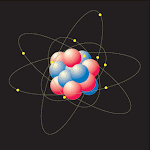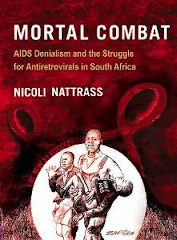I'm referring to denialism, of course.
Wednesday, May 26, 2010
RESPECTFUL INSOLENCE on Denialism Denial
Read more!
A view of Peter Duesberg from up the road: Stanford Gets It!
Strangely Charming: Lies, Damn Lies, and Statistics
Stanford Daily By Jack Cackler
Mark Twain, the 100th anniversary of whose death transpired just last month, was never known to be soft-spoken about his opinions. He popularized the phrase, “There are three kinds of lies: lies, damned lies, and statistics,” caustically opining the view that numbers can be used to dissemble truth. While Twain’s classic snarkiness may elicit frustrated delight from Stats 60 students everywhere, his story is only half formed. As statistics can be a tool for ill-intentioned academics to perpetuate falsehoods, a society well educated in statistics is the best defense against this kind of intellectual trickery. Today we’ll look at a recent case in which statistics were not used honestly, and how to guard against them in the future.
Stanford Daily By Jack Cackler
Mark Twain, the 100th anniversary of whose death transpired just last month, was never known to be soft-spoken about his opinions. He popularized the phrase, “There are three kinds of lies: lies, damned lies, and statistics,” caustically opining the view that numbers can be used to dissemble truth. While Twain’s classic snarkiness may elicit frustrated delight from Stats 60 students everywhere, his story is only half formed. As statistics can be a tool for ill-intentioned academics to perpetuate falsehoods, a society well educated in statistics is the best defense against this kind of intellectual trickery. Today we’ll look at a recent case in which statistics were not used honestly, and how to guard against them in the future.
Read more!
Saturday, May 22, 2010
The Cult of Denialism
Unreasonable doubt: Climate change, AIDS, GM foods – all have their detractors. But when does disbelief become dogma?
By Keith Kahn-Harris, New Humanist Magazine
It wasn’t supposed to be like this. We were supposed to be living in a world in which the methodical, rational, scientific accretion of knowledge would lead us down a path to a better world. That was the dream of Enlightenment, the bedrock of modernity.
But much has happened to challenge this dream. One doesn’t have to agree with Theodor Adorno or Zygmunt Bauman that the Holocaust was the apotheosis of an inhuman Enlightenment rationality to recognise that scientifically grounded bureaucracy can be used to control and slaughter millions. One doesn’t have to be a radical environmentalist to recognise that, from Thalidomide to DDT, the fruits of scientific progress can lead to horrendous unintended consequences. One doesn’t have to be a Richard Dawkins to observe the continued flourishing of religious fundamentalism and conclude that enlightenment has failed to take hold in many parts of the world.
Read more!
Saturday, May 15, 2010
Living in Denial

This week's New Scientist Magazine is dedicated to denialism. Several excellent articles. Well worth a look. Deborah MacKenzie's article is especially worth reading.
Living in denial: Why sensible people reject the truth
By Debora MacKenzie, New Scientist, May 12, 2010
HEARD the latest? The swine flu pandemic was a hoax: scientists, governments and the World Health Organization cooked it up in a vast conspiracy so that vaccine companies could make money.
Never mind that the flu fulfilled every scientific condition for a pandemic, thatthousands died, or that declaring a pandemic didn't provide huge scope for profiteering. A group of obscure European politicians concocted this conspiracy theory, and it is now doing the rounds even in educated circles.
This depressing tale is the latest incarnation of denialism, the systematic rejection of a body of science in favour of make-believe. There's a lot of it about, attacking evolution, global warming, tobacco research, HIV, vaccines - and now, it seems, flu. But why does it happen? What motivates people to retreat from the real world into denial?
Read more!
Thursday, May 6, 2010
Accountability for Reckless Abuse of Academic Credentials by AIDS Deniers
Unconventional thinkers or recklessly dangerous minds?
By Jon Cartwright
6 May 2010
Aids denialism is estimated to have killed many thousands. Jon Cartwright asks if scientists should be held accountable, while overleaf Bruce Charlton defends his decision to publish the work of an Aids sceptic, which sparked a row that has led to his being sacked and his journal abandoning its raison d'etre: presenting controversial ideas for scientific debate
In late 1996, Robert C, a social worker living in New York, was diagnosed as HIV-positive. At first he followed his doctor's advice and collected his prescription antiretrovirals, which stall the disease's progression. But he never took the drugs. Instead, encouraged by a series of articles in the US magazine Spin, he did nothing.
Read more!
Labels:
AIDS Denial,
AIDS Denialism,
denying,
Duesberg,
Henry Bauer,
peter duesberg
Tuesday, May 4, 2010
AIDS contrarian ignored warnings of scientific misconduct
By Jon Cartwright
Published in Nature 4 May 2010
A controversial scientist who is under investigation at the University of California, Berkeley, for making false claims in a paper and failing to declare a colleague's alleged conflict of interest ignored an earlier warning that he could face misconduct charges if the paper was published.
Earlier this month, molecular and cell biologist Peter Duesberg told the ScienceInsider policy blog that the publication of his paper in the journalMedical Hypotheses prompted two letters of complaint to Berkeley. After receiving the letters, the institution opened a misconduct investigation.
But Duesberg had earlier submitted the paper for publication in theJournal of Acquired Immune Deficiency Syndromes (JAIDS), and a review of the paper, seen by Nature, explicitly warns Duesberg that "cherry-picking" of results and a co-author's "obvious conflict of interest" could lead to misconduct charges if the paper were to be published. Despite the warnings, Duesberg chose to publish the paper in Medical Hypotheses, which does not peer review submissions.
Read more!
Subscribe to:
Posts (Atom)




















